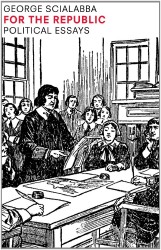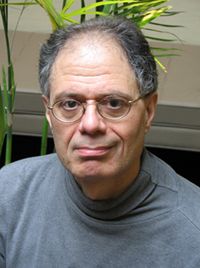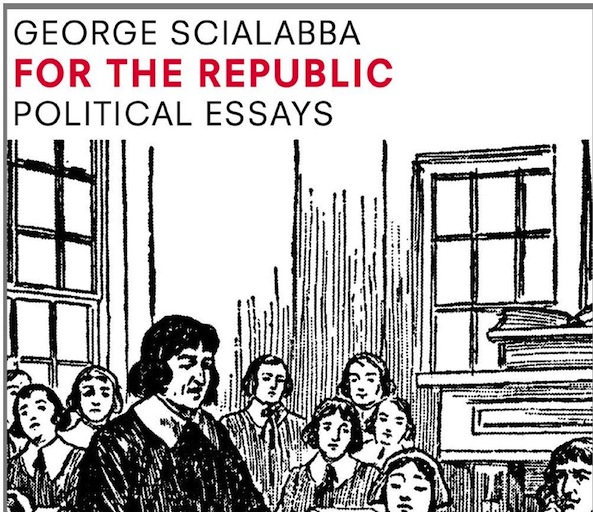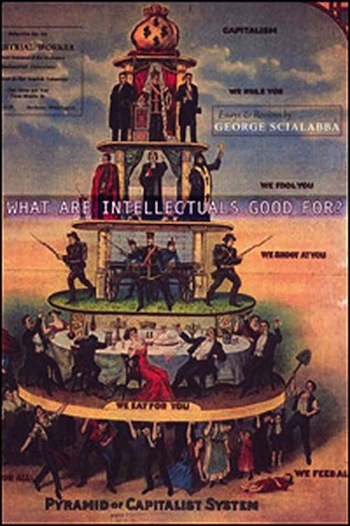Author Interview: George Scialabba’s “For the Republic” — An Independent View
By Bill Marx
George Scialabba is still outfoxing the professional eggheads in For the Republic, his third collection of essays on political and cultural topics.
In the 1973 film Charley Varrick, bank robber Walter Matthau carries off his final heist (and eludes muscle sent by the mob) with “the last of the independents” emblazoned on his shirt. Essayist/reviewer George Scialabba is not the last of his species, but he is one of the stubborn few still around who, standing outside of the academic industrial complex, write on political/cultural issues with the depth and panache of a whiz-bang scholar who is beholden to no one.
He continues to outfox the professional eggheads in his third collection of essays, For the Republic: Political Essays (Pressed Wafer, 256 pages, $15.95), which follows in the tradition set up by his previous two volumes — What Are Intellectuals Good For? and The Modern Predicament. It is a gathering of longish book reviews and incisive meditations on a variety of cultural and political topics.
This time around the pieces include thoughtful considerations of maverick journalist I.F. Stone, master critic Edmund Wilson, novelist and political agitator Victor Serge, heavyweight gadflies Gore Vidal and Christopher Hitchens, and social analyst Christopher Lasch. An undercurrent of disgruntlement runs through the book: for Scialabba, his dreams of ambitious economic and governmental reforms, crucial counters to rampant political and corporate corruption, will be mostly likely be foiled by consumer-fed passivity. Americans will never give up the hours of television watching necessary to right the debilitating wrongs. The melancholic strain in these pieces culminate in the striking “Letter from Room 101,” where Scialabba talks with at times alarming candor and emotional power about his struggles with debilitating depression and the painful price of independence.
Scialabba will discuss For the Republic at the Harvard Book Store in Cambridge, MA, on October 3rd. Harvey Blume and I couldn’t wait, and sent him a few questions raised by the essays and current events.
Arts Fuse: Impossible not to ask about Syria, though it turns out to be several questions rather than only one.
— Should the United States do nothing about Assad’s use of chemical weapons?
— Isn’t it possible that whatever we do will make the situation worse?
— Isn’t “mission creep” likely, if not inevitable?
— Has Obama’s hesitation upon hesitation muddled things or is this a case where he who does not hesitate and hesitate is lost?
George Scialabba: Yes, the United States should organize international action — through the UN, as provided by international law — against Assad’s, or anyone’s else, use of chemical weapons. Of course, this would be infinitely easier if the rest of the world didn’t, with much justification, regard the United States as a rogue state, a hypocritical, sanctimonious, violent, and ruthlessly self-serving superpower that has regularly disregarded international law and is arguably more responsible than any other nation, because of its preponderance of power since the founding of the UN, for rendering that institution, and international law generally, ineffectual. To point this out persistently seems to me the most useful thing American intellectuals can do. There is, on the other hand, no useful purpose served by accepting the premises of mainstream debate: that the US government has the right to decide whether and when to use military force without Security Council authorization; that US foreign policy has now, or ever had, primarily humanitarian rather than strategic purposes; or that there is a “national interest” behind domestic or foreign policy rather than a variety of often sharply opposing interests, usually corresponding to capitalists or the state vs. the rest of us, though sometimes involving secondary interests like maintaining the government’s legitimacy or manufacturing popular consent. For this reason, it’s also not helpful to say “we” when you mean “the US government.” You may identify with them, but they don’t identify with you.
AF: At the beginning of “An Enemy Of The State,” your essay on I.F. Stone, you allude to Obama’s statement before his inauguration in 2008 that he intended not to go after the Bush team about Iraq. Do you think Obama should have taken the other tack and called Bush, Cheney et al to account? How might he have done so? Where would we be if he had?
Scialabba: I don’t know exactly what Obama should have done: appointed a special prosecutor, created a Truth Commission or some other fact-finding body, referred the matter to the International Criminal Court, or done something else. Of course any of these actions might well have aroused widespread, hysterical, and probably violent opposition, both in the country and in Congress, which is very likely why he didn’t do any of them. The one thing, though, that he shouldn’t have done is what he did: carefully refrain from pointing out that there were plausible reasons to believe that grave crimes had been committed, and give as his reason for not acting that we should look ahead rather than back. This is at once a gross insult to the public and a contribution to its continuing infantilization.
AF: In your piece on I.F. Stone you maintain that even if he had colluded with the KGB — you argue there is no real proof — that should not color what we think of his lifelong critique of American foreign policy. You write, in support of this view, that: “Our judgments of Heidegger’s philosophy and Paul de Man’s literary criticism are not (or should not be) affected by their various degrees of sympathy with Nazism.” What do you say to those who argue that Heidegger’s anti-Semitic and pro-Nazi views can and should raise doubts about his philosophy — by finding their imprints on his thinking?
Scialabba: I have very little understanding of Heidegger’s ideas, though I hesitate to dismiss them, because other philosophers whom I greatly respect, including Merleau-Ponty, Richard Rorty, Charles Taylor, and Hubert Dreyfus, have written about them sympathetically, even admiringly. What I meant in the comment you cite is that if Heidegger shared some opinion or other with Hitler, then there are two possibilities: they were both wrong about the matter or they were both right. The only way to know is to examine the opinion. It’s intellectually lazy and dishonest to argue either: “X said A, which is wrong; therefore everything X said must be wrong” or “X and Y agree in believing A, but Y is a monster and a charlatan, so X must also be a monster and a charlatan.”
For the record, the case of Stone and Stalin is very different from that of Heidegger and Hitler. Heidegger praised Hitler and accepted an official position under the Nazis; he never withdrew the former or apologized for the latter. Stone, by contrast, never endorsed Stalinism and in fact frequently denounced it. He spoke with Soviet diplomats (some of whom were undoubtedly intelligence agents) and occasionally exchanged information with them, but so did most reporters during World War II. The evidence that Stone ever told the Soviets anything important, or was paid for the information, is nil. Finally, while it is at least conceivable that Heidegger is a windbag and a charlatan, Stone is unquestionably one of the greatest investigative reporters and political critics of the 20th century. His real crime, for his neoconservative vilifiers, was not espionage but rather his skepticism about the moral pretensions of America’s Cold War foreign policy.
AF: In his late work, historian Tony Judt praises dissidents in Eastern Europe as compared to leftists in Western Europe, who were much less at risk. But would you agree that in making this comparison Judt oddly overlooks the experience of the American anti-war movement in that period, and the risks incurred in opposing the draft and the War in Vietnam?
Scialabba: I’m not sure I see the point of Judt’s comparison. The responsibility of citizens is to make a difference where they can: usually by calling their own government to account, since that’s where their efforts can have most effect. The East European dissidents opposed the unjust actions of their governments; Western New Leftists opposed the unjust actions of their governments. It’s true that, in that era, developed Western societies were freer and more open than Eastern ones, and so the cost of dissent in the latter was usually greater than in the former. On the other hand, nowhere in Eastern Europe was dissent as dangerous as it was in Central and South America, which were essentially the United States’ satellite sphere, as Eastern Europe was the Russians’. Dissidents in El Salvador, Guatemala, and Argentina, murdered and disappeared by the hundreds of thousands, were far braver than their counterparts in Eastern Europe, Western Europe, or the US.
AF: The William Hazlitt quotation with which you end the piece about Christopher Hitchens is exquisitely appropriate: “When he took a side, his vanity or his spleen more frequently gave the casting vote than his judgment; and the fierceness of his zeal was in exact proportion to the levity of his understanding, and the want of conscious sincerity.” It would also have been a useful quotation to keep in mind when praising (without much reservation) the writing of Gore Vidal. You overlook his take on the Oklahoma City Bombing, where he tried to drum up sympathy for Timothy McVeigh. Also, Vidal could be as single-mindedly mean-spirited as the neo-cons, such as Hilton Kramer, whom you justifiably critique. When hearing of the death of Truman Capote, Vidal quipped, without missing a beat, “good career move.” Funny, but heartless.
Scialabba: I’m not a connoisseur of mean-spiritedness, but in my amateur judgment, Gore Vidal was no match for Hilton Kramer. Vidal usually stung, while Kramer usually bludgeoned; Vidal ridiculed, while Kramer indicted. And Vidal’s sympathies were a bit more catholic than Kramer’s. Yes, Vidal sometimes slagged people unfairly. But his memoirs, Palimpsest and Point-to-Point Navigation, are remarkably free of petty score-settling. And Vidal was simply so much better a writer and thinker than Kramer, and bashing other people is so much less central to his work, that — quite apart from whether one agrees with him or not — he deserves a tad readier forgiveness than Kramer.
I haven’t read much about Timothy McVeigh, but as I remember, all Vidal set out to prove was that McVeigh was more thoughtful than the knee-jerk punditocracy had assumed and that some genuine grievances underlay his anti-government right-wing populism. Seemed plausible to me. I don’t understand why the crack about Capote is objectionable. Capote was, after all, an obsessive careerist. And besides, you can’t really be cruel to the dead — unlike the living, they feel no pain. Those who love them do, of course, but did anyone actually love Capote?
AF: It is interesting that your favorite utopian vision can be found in Arthur C. Clarke’s science fiction novel Childhood’s End — is there nothing that can help us out of the mess we have made but the help of benevolence extraterrestrials? Isn’t that suggesting that we should pray for masters of the well-meaning variety? How rooted in Swiftian despair is your vision of hope?
Scialabba: Well, yes, there’s a lot we can do besides waiting for the Overmind (or the Singularity). See For the Republic, passim. Actually, my favorite utopias are Ernest Callenbach’s Ecotopia, Edward Bellamy’s Looking Backward, and William Morris’ News from Nowhere. (Morris wrote his as an appalled protest against Bellamy’s, but I love both of them.) Childhood’s End is a charming and mind-expanding, though largely unpolitical, fable. And it could happen.
AF: You agree with those who believe that the internet is fundamentally changing our experience of careful, deep reading, destroying its precious inwardness. Yet today’s world of corruption, political cowardice, ignorance, and plutocratic malfeasance evolved at time when this self-conscious ideal of cultural consumption was valued, a time when concentration camp administrators read Goethe at night once the day’s work was done.:
Scialabba: You’re right, inwardness doesn’t guarantee virtue. Neither does health or education or economic security. Yet all those things are good in themselves. It’s certainly possible to be a monster despite plenty of inwardness, but I’m not sure it’s possible to be an artist, or even a good citizen or parent, without it. Or just to have a rich and satisfying life. Anyway, I find the people who’ve been making that argument recently — Sven Birkerts, Jaron Lanier, Nicholas Carr, Rebecca Solnit, among others — persuasive.
AF: In your piece on the critic Edmund Wilson, you talk about the ‘objective’ evaluation of critics. What does that mean? Criticism is subjective — judgments backed up by good reasons and skillful rhetoric. It is a matter of persuasion, as well as the real politick (cultural) power of the publication where the criticism appears.
Scialabba: I can’t really improve on Wilson’s answer: “The implied position of the people who know about literature (as is also the case in every other art) is simply that they know what they know, and that they are determined to impose their opinions by main force of eloquence and assertion on the people who do not know.” Of course this does not prove the “objective truth” of their judgments. Like his fellow radical pragmatists Nietzsche, James, and Rorty, Wilson does not believe in “objective truth.” The truth is whatever “makes life more practicable”; when we come across it, “we experience a deep satisfaction: we have been cured of some ache of disorder, relieved of some oppressive burden of uncomprehended events … This relief that brings the sense of power, and, with the sense of power, joy, is the positive emotion which tells us that we have encountered a first-rate piece of literature [or history or philosophy].” William James couldn’t have said it better – and that’s saying something.
George Scialabba’s work is archived here.
Tagged: essays, For The Republic, George Scialabba, Reviews, The Modern Predicament





Regarding Gore Vidal: No love for Truman Capote (who wrote some good books), but understanding for mass murderer Timothy McVeigh? Those who find these values a trifle askew might want to go beyond blind iconoclast-worship and explore some sharp examples of taking on Vidal. I would suggest Robert Boyers’ “On Gore Vidal: Wit and the Work of Criticism” in the volume Gore Vidal: Writer Against the Grain and Adam Mars-Jones’ smack-down of Palimpsest (“Gore Vidal/Regal Void”) in his collection Blind Bitter Happiness, particularly Mars-Jones’ analysis of Vidal’s self-aggrandizing game of nimbly interweaving celebrity suck-up and patrician disdain. Vidal had his virtues as a critic, but he — no more than right-wing sniper Hilton Kramer — should not be given a free pass.
Emerson observed that “intellectual tasting of life will not supersede muscular activity. If a man should consider the nicety of a passage of a piece of bread down his throat he would starve.” For me, the professional curators of “inwardness” risk choking on their own refined sensibilities. The values of humanity and morality have often been served, when the authoritarian chips are down, by ordinary people risking their lives to do the right thing. The unbookish but courageous Miep Gies helped Anne Frank and her family survive; meanwhile, many (most?) of the ‘deep’ readers in the neighborhood ran for the hills. The latter no doubt picked up Frank’s diary years later and cooed with “rich and satisfying” pleasure as they read it.
I admit the considerable value of “deep reading,” but I don’t see what good it does to fetishize it, which is what Birkerts and crew end up doing, with the predictable result (in America) of setting up a medicinal priesthood. Here comes a wave of literary self-help books, such as Slow Reading in a Hurried Age, selling the notion that ‘deep” reading provides a healthy workout for flabby brains. Put away the computer, make a cup of tea, and do a little “slow reading” – your super-sized consciousness will thank you for it.
Edmund Wilson suggests that the joy of reading first-rate literature “makes life more practical.” I’d like to think he means that it should provide more than just tingly instances of Nabokov’s “aesthetic bliss” (as important as that is), but it should also move minds out of culs-de-sac by generating new fields of interest, perhaps spark some of the crucial political and cultural engagement Scialabba calls for in For the Republic. Television isn’t the only cultural hatchet man – there are a number of ways in which we amuse ourselves to death.
Let’s say that when the members of the cult of literary inwardness write about union strikes (as Wilson did), I will be more impressed.
Since no one else has yet taken up the cudgels in defense of poor Scialabba against our querulous editor, I will.
Yes, one definitely wants to understand mass murderers, or even one-off murderers. Likewise terrorists. Unless, that is, one doesn’t care much about preventing such crimes in future. You can’t prevent what you don’t understand, as a few sapient people pointed out after 9/11, when not understanding the grievances of Islamic jihadists (more precisely, intimidating the media and the public from questioning the Bush administration’s line that they hate us because we’re so good) cost hundreds of thousands of lives and wasted a trillion dollars (and, not incidentally, bred a new generation of jihadis).
In the case of McVeigh, it’s extremely important to understand that extreme right-wing anti-government types of his ilk, of whom there are very many, and who are after all our fellow citizens, have legitimate grievances. Can anyone question this after the Snowden revelations? The relentless expansion of executive-branch power and the metastasis of the national security state are among the central political problems of our time. Liberals and conservatives don’t care, so lefties and righties had better start talking to one another. Apart from that strategic point, any thoughtful person should have been disgusted by the mindless, reflexive demonization of McVeigh. He may have been a demon (though Vidal persuaded me that he was instead a slightly deranged and simple-minded John Brown). But we should be grateful to Vidal, if only on grounds of cultural hygiene, for thumbing his nose at the brainless conformism of the media horde.
Haven’t read the Boyers or Mars-Jones pieces, but Palimpsest is a wry, witty, affecting book.
Birkerts’ Gutenberg Elegies is about as far from a self-help book as it’s possible to be. It’s an astonishingly prescient diagnosis of the flattening of affect and consciousness and the erosion of individuality that loom as possibilities (increasingly, actualities) in the electronic millennium. It’s also an exquisite phenomenology of reading — at least his kind, which no one supposes is the only kind, but which is most definitely less common in recent decades, and which, since it doesn’t generate profit centers, very much needs defenders. As for the self-help vulgarizations … well, of course they’re all Birkerts’ fault.
Does anyone imagine that Wilson is recommending merely that we amuse ourselves, or that he thinks aesthetic pleasure is just another tingle among the ever-expanding array of consumable sensations? The relation between aesthetic virtue and moral or political virtue is not straightforward, but they’re hardly antithetical, as you seem to be suggesting.
Even more misguided is your fundamental premise: that artists have an obligation, as artists, to be politically engaged. Artists are citizens, just as mathematicians and bricklayers are. They have the same civic obligations, plus whatever extra obligations accrue to the educated and affluent in a society where not everyone is. And of course in an emergency (cf. Anne Frank), everyone has extra obligations.
If some writers’ genius leads them to write about politics, more power to them. But if others’ genius leads them to write about something other than politics, then more power to them too. Followers of any practice have an obligation to master that practice. There may (though I’m not sure of that) be exceptions — I can’t think of any at the moment — but as a rule, aesthetic mediocrity is never politically helpful and aesthetic excellence is never politically harmful.